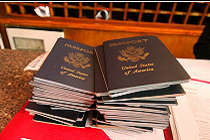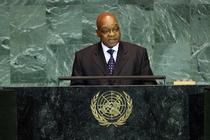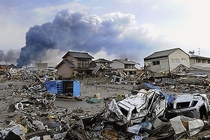Conflict zones: Intentions vs. outcome
Sreeram Chaulia, Vice Dean of the Jindal School of International Affairs, talks to Gateway House’s Samyukta Lakshman about his new book titled, "International Organisations and Civilian Protection".
Sreeram Chaulia, Vice Dean of the Jindal School of International Affairs, talks to Gateway House’s Samyukta Lakshman about his new book titled, "International Organisations and Civilian Protection".
 Courtesy: FourthFloor/Flickr
Courtesy: FourthFloor/Flickr
Despite their economic downturns, domestic tensions keep developed countries from embracing the revitalizing potential of foreign workers. Ambassador Neelam Deo argues that India should continue to leverage its history of diversity and capitalize on a world more open to the free flow of goods and services.
 Courtesy: WorldEconomicForum/Flickr
Courtesy: WorldEconomicForum/Flickr
With the post for the head of the International Monetary Fund up for grabs, the emerging market countries are yet to unite and provide a suitable candidate who receives formidable support for his or her candidature. China, however, may boldly question the status quo and step ahead.
 Courtesy: Katrina.Tuliao/Flickr
Courtesy: Katrina.Tuliao/Flickr
The 2008 financial collapse has economists pondering over the stability of global economies and the ability of those with financial power to maintain their wealth. If such a situation recurs, who will be held accountable?
The Navy, Coast Guard, Police and maritime companies now encounter new threats, as piracy threatens the Indian seas and our trade routes. This calls for a united approach in combating threats and even more so, for a single governing body for maritime issues.
 Courtesy: UNPhoto/MarcoCastro
Courtesy: UNPhoto/MarcoCastro
As the newest entrant of the BRICS group, South Africa's unpredictability in upholding the human rights dimension of its foreign policy agenda, by its stance to impose a ‘no fly zone’ over Libya, has brought about an incoherency between the BRIC countries and South Africa.
Frank Wisner, the legendary US diplomat who was not only President Barack Obama's special envoy to Egypt but also a former ambassador to India, discusses the outlook for Egypt, resolving the mayhem in the Middle East and India-Pakistan relations in a Gateway House exclusive.
 Courtesy: Generationbass.com/Flickr
Courtesy: Generationbass.com/Flickr
The impact of the earthquake and subsequent tsunami on Japan could be graver than imagined but it’s an opportunity for Prime Minister Kan to take decisive action and strengthen his administration.
 Courtesy: Durova/Wikipedia
Courtesy: Durova/Wikipedia
Japan has always been the quickest to extend relief to any country facing a humanitarian crisis. In the wake of its cataclysmic earthquake and subsequent tsunami, the former Indian Ambassador to Japan hopes that India can extend the same measure of compassion to a country that is celebrated for its resurgence.
 Courtesy: CrethiPlethi/Flickr
Courtesy: CrethiPlethi/Flickr
As the Arab world reinvents itself in real time, the rest of the world must begin to understand the region as something more than a source for oil and a market for armaments and consumer goods.